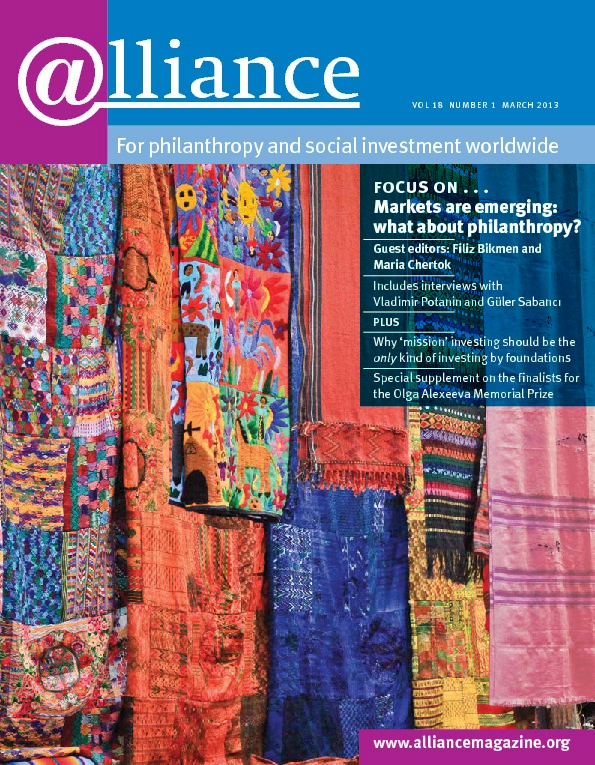Can better data on global human rights funding help human rights grantmakers to collectively identify and address gaps and to promote more strategic and effective human rights grantmaking? The International Human Rights Funders Group (IHRFG) and the Foundation Center have partnered on the first-ever multi-year effort to map and analyse human rights funding globally.
As a first step, the Advancing Human Rights: Knowledge Tools for Funders initiative advisory committee, comprising eight human rights funders, devised a definition of human rights grantmaking: ‘A grant or grants programme is defined as human rights funding if it seeks systemic change in the implementation of the rights that follow through the strategic application of philanthropic funds for or to individuals, communities, institutions, and movements.’
In addition to enabling tracking of human rights funding, the new definition may provide greater conceptual clarity for potential human rights donors. It may also create better understanding of the intersections of human rights with other issues.
Data analysis showed that $1.2 billion in human rights funding was granted in 2010. The vast majority of human rights funders in the study are based in the US (652), followed by Western Europe with 28. A number of funders based in Latin America, Asia and the Pacific, Eastern Europe, Sub-Saharan Africa and the Middle East and North Africa were also included.
Similar proportions are evident in the distribution of the funding, with slightly over half, 54.1 per cent, focused on North America. This largely reflects the greater availability of information on grantmaking in the US, and we expect that this will balance out as more information comes from foundation communities around the world. Nevertheless, the amount and diversity of rights-based grantmaking in the US for activities such as ensuring access to healthcare, environmental rights and access to justice may come as a surprise to some.
Interestingly, however, though the next biggest cohort of funders came from Western Europe, the region accounted for only 5.3 per cent of funding. The least favoured was the Caribbean, at 0.67 per cent.
The most funded thematic area was ‘individual integrity, liberty and security’, at 36 per cent of funding. Women and girls, at 23 per cent, were the population group that received most support – again, a figure that some may find surprisingly high. Children and young people accounted for over 14 per cent of grant dollars.
While this research yields valuable information for the field, it is by no means perfect. Capturing the depth and nuance of human rights philanthropy is first and foremost constrained by the lack of detail provided. Significantly, the second largest issue area funded was ‘human rights general’. An example of a grant in this category is one to ‘protect human rights’ in a specific country where no additional information is available.
A key challenge here is ensuring grantee safety while also promoting transparency. In many cases, funders felt that revealing the name, location or exact nature of their grantee’s work would expose the organization to danger. Related to this, some foundations may intentionally obscure the purpose of their ‘riskier’ giving or use a different frame for it in places where human rights has a negative or dangerous connotation.
Finally, the data collection is by no means comprehensive. Over the next two years, we will continue to expand the base of funders providing data for this initiative, particularly among grantmakers based outside the US. At the same time, the research depends on foundations that have already provided data continuing to doing so. We also plan to include information on funding by bilateral and multilateral donors.
Where do we go from here?
We expect that further investigation will provide a more detailed understanding of human rights funding and possible gaps in support. While human rights grantmaking has a cohesive group of funders at its nucleus, the research showed that hundreds of foundations operating outside formal human rights networks do support human rights work. This offers great possibilities for new learning, coordination and collaboration among funders seeking to advance human rights.
We will be facilitating discussion of these findings in the broader philanthropic community throughout 2013. These discussions will include critical thinking about ways to improve this research project. Your input and feedback on the research methodology, tools and publications, and on future areas for research, are greatly appreciated.
Christen Dobson is the Programme Manager for Policy and Research at IHRFG. Email cdobson@ihrfg.org
Steven Lawrence is Director of Research at the Foundation Center. Email sal@foundationcenter.org
For more information
http://www.ihrfg.org/events/launch-advancing-human-rights-state-global-foundation-grantmaking-key-findings



Comments (0)